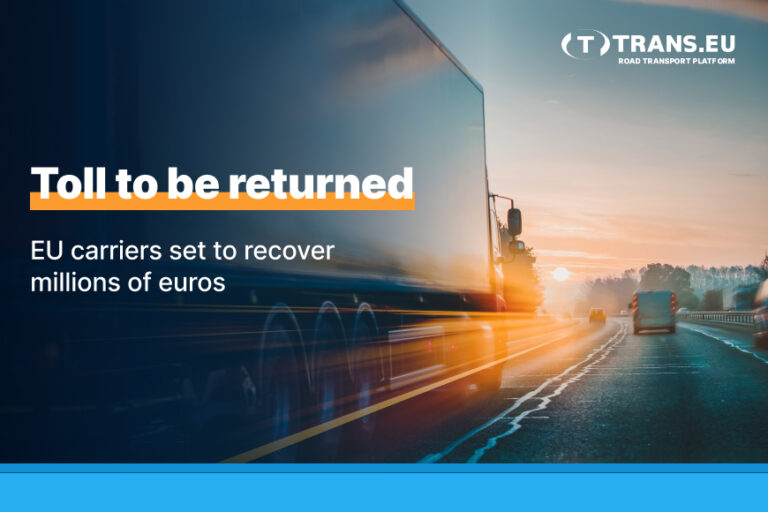Carriers from all over Europe have won another battle with the German state for the refund of part of the toll. The Administrative Court in Cologne admitted that in the years 2016–2020 the toll was collected incorrectly. Thanks to the ruling of the Cologne court, nearly 32 thousand transport companies can count on the return of part of the collected funds.
Despite the favorable ruling, carriers still have a long wait ahead of them. The Federal Office of Logistics and Mobility (BALM), representing the government administration, has just appealed to a higher court. In practice, this means at least 12 months of waiting for another, this time final judgment.
Fast track, but less profitable
With large sums at stake, it’s worth being patient. According to the court’s judgment, carriers from all over Europe are entitled to a refund of 5.86% of the toll for the years 2016–2018 and 4.44% for the years 2019–2020. Including interest. In the case of medium-sized carriers, regularly using German motorways, it can be as much as 300,000–400,000 euros. The largest companies can count on a refund of up to one million euros.
“At the same time, BALM made it possible to use the fast track to recover money through the state-owned Toll Collect system. All you have to do is fill out a simple form on the website, attach invoice numbers and wait for the money,” says Łukasz Chwalczuk, partner at Iuridica law firm, which specializes in European transport law.
But the fast track for refunding part of the toll through Toll Collect has some downsides. Owners of transport companies can receive only 3.9% refund instead of the 5.86% awarded for the years 2016–2018. In addition, they will not receive any interest, and in many cases it may be equal to the amount of the principal.
Court sides with carriers
The Administrative Court in Cologne awarded interest at the rate of 5 percentage points above the base rate provided for in EU law. Currently, the interest is therefore 8.62%, calculated from the date of payment of the toll. According to the statements of transport associations in Europe, most carriers prefer to wait for the final court verdict. The appeal against the judgment will be decided by the Higher Administrative Court of Münster (Oberverwaltungsgericht, OVG).
Transport market experts and lawyers from all over Europe, who are involved in the case, cannot imagine a verdict other than the one passed in Cologne. What do they base their belief on? “This is because the Court of Justice of the European Union sided with the carriers as early as October 2020. In its judgment, it stated that the federal government should not charge toll payers with the costs of maintaining the traffic police. After the CJEU judgment, the Federal Office for Logistics and Mobility received requests for reimbursement from some 32,000 EU transport companies,” says Łukasz Chwalczuk from Iuridica.
Not many believers
The irregularities related to toll collection were first pointed out by German lawyer Martin Pfnür. It is thanks to his great commitment, with the support of the Polish law firm Iuridica, that a storm has been unleashed, and it may soon seriously shake the German budget. Pfnür began the procedure before the German court, which consequently ended with the judgment of the Court of Justice discussed above. And it opened the way to compensation.
At the time, they represented just over thirty transport companies, mostly from Poland, who believed the whole procedure made sense. Iuridica together with Pfnür demanded the reimbursement of part of the toll for a year and a half in 2010–2011. The Court of Justice has opened the way for compensation, which carriers have already received. The record holder – a medium-sized transport company – received nearly 250,000 euros with interest. But other applicants can count on even higher amounts.
“After many years of litigation and even initial ridicule by toll collectors in Germany, justice has been served. The inclusion of costs related to traffic police activities in the toll was disputed. The European Union has unequivocally confirmed that road tolls can only be used to improve road safety, construction, repairs, etc. As for the police, they need to be paid from the state budget, not from the private money of transport companies,” says Łukasz Chwalczuk.
BALM appeals
The German government has adopted a strategy of delaying the reimbursement of further amounts. It was only a year after the judgment of the Court of Justice of the EU – in October 2021 – that the Bundestag adopted new rules on toll charging. But this gave carriers the opportunity to recover additional amounts. In the German court procedure, there is a three-year limitation period, so until the end of September this year, transport companies can still apply for the reimbursement of the toll.
Experts estimate that on a European scale, it could be as much as 4–5 billion euros. The largest number of applications for toll refund was submitted by carriers from Poland, Lithuania, the Czech Republic, France, the Netherlands and Spain. And, of course, from Germany, as the toll also applied to transport companies there.
“BALM has appealed, now we have to wait patiently for the ruling of the court in Münster. We are positive that everything will work out in our favor,” concludes Łukasz Chwalczuk.





